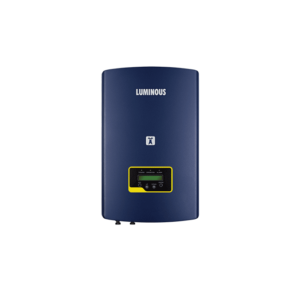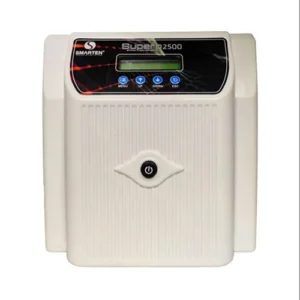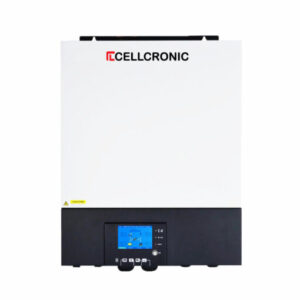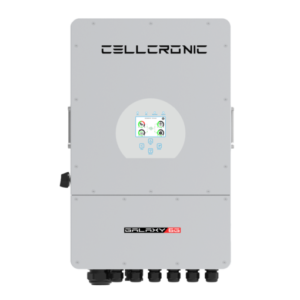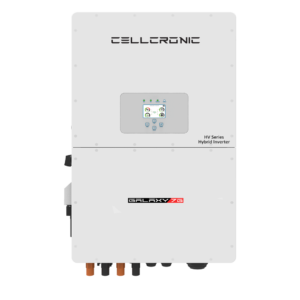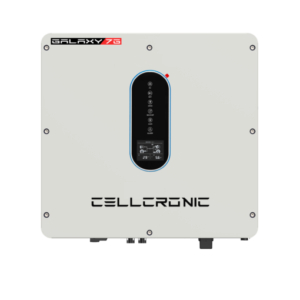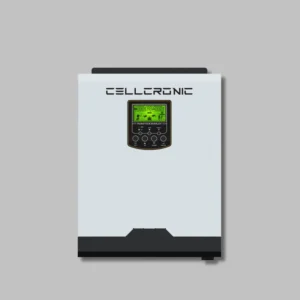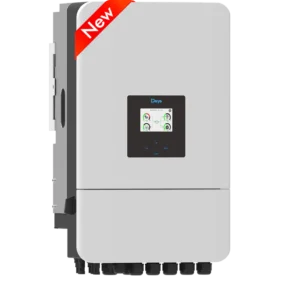Hybrid Solar Inverter

A hybrid solar inverter is a multipurpose device that integrates the capabilities of a battery inverter and a grid-tied solar inverter into a single unit. It can easily manage power from a variety of sources, including solar panels, battery storage, and the utility grid, thanks to its bidirectional power conversion capability. In addition to turning AC into DC to charge the solar batteries, the inverter transforms DC from solar panels into AC to power loads. Its capacity to use the energy storage system to supply dependable backup power during blackouts or times of high demand is a significant benefit.
Because the hybrid inverter is grid-tied, users in areas with net metering regulations can export excess solar power to the utility grid, which lowers costs. On the other hand, when solar When production isn’t enough, the inverter can use the grid’s AC power to charge batteries. This integrated design provides a small and adaptable solution that enables businesses and homeowners to maximize the use of solar energy produced from photovoltaic systems.
There are two main types of hybrid solar inverter:
on grid hybrid solar inverter and off grid hybrid solar inverter. Grid-tied inverters are connected to the utility grid and can feed excess solar power back into the grid, earning you credits on your electricity bill. Off grid solar inverter, on the other hand, are designed to work independently of the grid and are often used in remote areas where access to the grid is limited.
hybrid solar inverter offer several benefits over traditional inverters. They are more energy efficient inverters, meaning they can help you save money on your electricity bills. They also allow you to store excess solar power in batteries for use during power outages or at night when the sun isn’t shining. Additionally, hybrid solar inverter can help reduce your carbon footprint by relying less on fossil fuels and more on clean, renewable energy.
Key Takeaways:
- hybrid solar inverter combine the functions of a solar inverter and a battery-based inverter to optimize energy efficiency.
- There are two main types of hybrid solar inverter: grid-tied and off-grid.
- hybrid solar inverter are more energy-efficient and can help you save money on your electricity bills.
- They allow you to store excess solar power in batteries for use during power outages or at night.
- Hybrid solar inverter can help reduce your carbon footprint by relying on clean, renewable energy.
Understanding hybrid solar inverter
If you’re considering installing a solar power system, it’s important to understand the role of a hybrid solar inverter. Unlike traditional inverters, hybrid solar inverter have advanced capabilities that allow for increased energy efficiency and cost savings.
One of the main benefits of a hybrid solar inverter is its ability to draw power from both solar panels and the grid. An advanced hybrid inverter can intelligently switch between the two sources to ensure maximum efficiency and minimal waste. This means that if your solar panels are not producing enough power to meet your needs, the inverter can supplement the rest of the energy from the grid.
The Advantages of an Energy Efficient Inverter
Hybrid solar inverter are also designed to be highly energy efficient, which can result in significant cost savings over time. An energy efficient inverter can help reduce your electricity bills by ensuring that only the necessary amount of power is consumed, while any excess energy is fed back into the grid or stored in batteries for later use.
Additionally, solar power inverters can help reduce your reliance on the grid. By maximizing the amount of solar energy used in your home or business, you can decrease your carbon footprint and contribute to a more sustainable future.
What are the different functions of a hybrid solar inverter?
The main purpose of an inverter is to convert the direct current (DC) that comes from your solar panels into alternating current (AC) that your home can use. Using a hybrid solar inverter elevates this technique to a whole new level and offers several advantages, such as the following.
AC to DC Bidirectional Power Conversion Direct current (DC) electricity from solar panels or DC electricity converted from alternating current (AC) electricity using a solar inverter (AC linked) are the two most common ways that solar batteries are charged. Before the power can be released, an inverter must transform the stored direct current electricity into alternating current electricity.
When production isn’t enough, the inverter can use the grid’s AC power to charge batteries. This integrated design provides a small and adaptable solution that enables businesses and homeowners to maximize the use of solar energy produced from photovoltaic systems.
Control of the Power Source Depending on the weather and time of day, solar panels can generate varying amounts of power. This is due to variations in the amount of sunlight during the day. To ensure that the entire system operates within the predetermined parameters, a hybrid inverter regulates and controls this electricity.
Monitoring of Power To test and monitor your photovoltaic system, solar hybrid grid-tied inverters can be equipped with solar power monitoring software. The inverter’s display screen or an app on a smartphone that is linked can be used for this. This can help identify any issues within the system.
Maximum Power Point Trackers (MPPT) in hybrid inverters measure the amount of electricity generated by your solar panels and compare it to the voltage of the battery. To extract as much power as possible from the system, this is done. As a result, the maximum power can be generated and DC electricity can be converted into the voltage that charges the battery the most. Your MPPT ensures that your solar power system will function properly regardless of the sun’s brightness, the solar panels’ temperature, or the amount of electricity being used.
Benefits of Hybrid Solar Inverter
One of the main benefits of hybrid solar inverter is the significant reduction in electricity bills they provide. By using solar power during the day and switching to grid power at night, users can keep their energy consumption to a minimum, resulting in lower monthly bills. Additionally, hybrid solar inverters offer greater energy independence, reducing reliance on the grid and providing consistent power even during power outages.
How Hybrid Solar Inverter Works
Hybrid solar inverters work by converting DC power generated by solar panels into usable AC power, which can be used to power homes or businesses. The inverters can also be linked to battery storage systems, allowing excess power generated during the day to be stored and used when needed, further reducing grid dependence. Additionally, the inverters can monitor energy consumption and adjust power output accordingly, ensuring maximum efficiency.
A solar hybrid grid-tie inverter makes the work of a traditional solar inverter easier and better by putting all of its functions into a single device. These features include grid connection and solar panel charging. Even better, because the amount of solar power that is available can vary depending on the weather and the time of year, a hybrid inverter can, if necessary, draw power from the electricity grid to charge your battery storage system. This is a significant benefit because the amount of solar power that is available can change.
Hybrid Solar Inverter Uses
Hybrid solar inverters can be used in both residential and commercial settings to maximize energy efficiency. In residential settings, they can power essential appliances and provide backup power during outages. In commercial settings, they can be used to power factories, offices, and other facilities, helping businesses reduce their energy costs while maintaining productivity.
Overall, hybrid solar inverters offer a cost-effective and sustainable energy solution for users in India. By reducing reliance on the grid and utilizing solar power, users can enjoy greater energy independence and lower electricity bills. Whether it’s for residential or commercial use, hybrid solar inverters are an investment worth considering for anyone looking to maximize energy efficiency.
Showing 1–12 of 16 results
Falcon 6G Plus 5.5KW-48v Hybrid Inverter
Cellcronics Hybrid On Grid Inverter Original price was: ₹109,998.00.₹104,998.00Current price is: ₹104,998.00.Falcon 6G Plus 8kw-48V Hybrid Inverter
Cellcronics Hybrid On Grid Inverter Original price was: ₹141,998.00.₹136,998.00Current price is: ₹136,998.00.Galaxy 6G EU 12kw Three Phase Dual Mppt Hybrid Inverter
Cellcronics Hybrid On Grid Inverter Original price was: ₹269,998.00.₹264,998.00Current price is: ₹264,998.00.Galaxy 6G EU 16Kw Tripple Mppt Hybrid Inverter
Cellcronics Hybrid On Grid Inverter Original price was: ₹402,998.00.₹397,998.00Current price is: ₹397,998.00.Galaxy 6G EU 3Kw Hybrid Inverter
Cellcronics Hybrid On Grid Inverter Original price was: ₹99,998.00.₹94,998.00Current price is: ₹94,998.00.Galaxy 6G EU 5Kw Dual Mppt Hybrid Inverter
Cellcronics Hybrid On Grid Inverter Original price was: ₹124,997.00.₹119,997.00Current price is: ₹119,997.00.Galaxy 6G EU 8Kw Dual Mppt Hybrid Inverter
Cellcronics Hybrid On Grid Inverter Original price was: ₹184,998.00.₹179,998.00Current price is: ₹179,998.00.Galaxy 7G EU 50Kw HV Hybrid Inverter
Cellcronics Hybrid On Grid Inverter Original price was: ₹902,998.00.₹897,998.00Current price is: ₹897,998.00.Galaxy 7G EU 5Kw Dual Mppt Hybrid Inverter
Cellcronics Hybrid On Grid Inverter Original price was: ₹144,998.00.₹139,998.00Current price is: ₹139,998.00.Magnum 2.5kw-24v
Cellcronics Hybrid Off Grid Inverter Original price was: ₹52,188.00.₹49,106.00Current price is: ₹49,106.00.SUN-14/15/16/18/20K-SG05LP3-EU-SM2 | 14-20kW | Three Phase
Deye Hybrid On Grid Inverter Original price was: ₹345,678.00.₹225,000.00Current price is: ₹225,000.00.SUN-3/3.6/5/6K-SG04LP1-EU-SM1/2 | 3-6kW | Single Phase | 2 MPPT | Hybrid Inverter | LV Battery Supported
Deye Hybrid On Grid Inverter Original price was: ₹98,400.00.₹80,500.00Current price is: ₹80,500.00.



